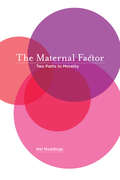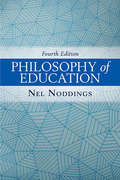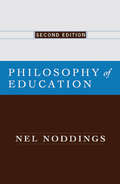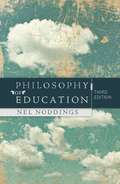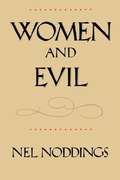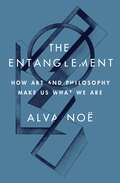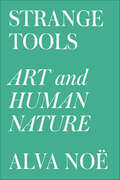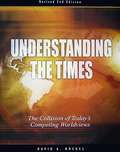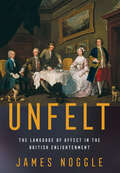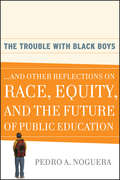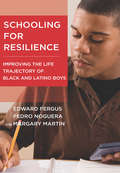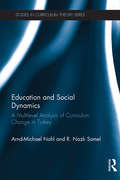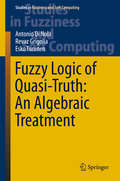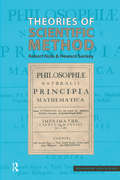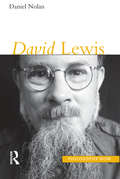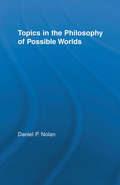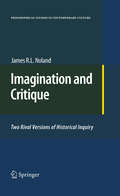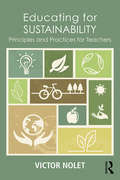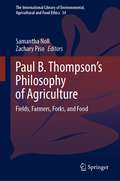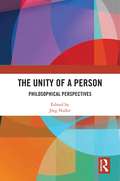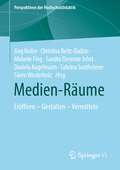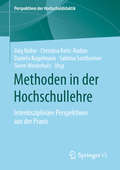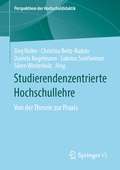- Table View
- List View
The Maternal Factor: Two Paths to Morality
by Nel NoddingsIn this provocative new book, renowned educator and philosopher Nel Noddings extends her influential work on the ethics of care toward a compelling objective--global peace and justice. She asks: If we celebrate the success of women becoming more like men in professional life, should we not simultaneously hope that men become more like women--in caring for others, rejecting violence, and valuing the work of caring both publicly and personally? Drawing on current work on evolution, and bringing concrete examples from women's lived experience to make a strong case for her position, Noddings answers this question by locating one source of morality in maternal instinct. She traces the development of the maternal instinct to natural caring and ethical caring, offering a preliminary sketch of what a care-driven concept of justice might look like. Finally, to advance the cause of caring, peace, and women's advancement, Noddings urges women to abandon institutional, patriarchal religion and to seek their own paths to spirituality.
The Philosophy of Education
by Nel NoddingsThe first edition of Nel Noddings' Philosophy of Education was acclaimed as the "best overview in the field" by the journal Teaching Philosophy and predicted to "become the standard textbook in philosophy of education" by Educational Theory. This classic text, originally designed to give the education student a comprehensive look at philosophical thought in relation to teaching, learning, research, and educational policy, has now been updated to reflect the most current thinking in the field. A revised chapter on Logic and Critical Thinking makes the topic more accessible to students and examines how critical thinking plays a role in light of the new Common Core standards. Philosophy of Education introduces students to the evolution of educational thought, from the founding fathers to contemporary theorists, with consideration of both analytic and continental traditions. This is an essential text not only for teachers and future teachers, but also for anyone needing a survey of contemporary trends in philosophy of education.
Philosophy of Education
by Nel NoddingsThe first edition of Nel Noddings' Philosophy of Education was acclaimed as the "best overview in the field" by the journal Teaching Philosophy and predicted to "become the standard textbook in philosophy of education" by Educational Theory. This classic text, originally designed to give the education student a comprehensive look at philosophical thought in relation to teaching, learning, research, and educational policy, has now been updated to reflect the most current thinking in the field. A revised chapter on Logic and Critical Thinking makes the topic more accessible to students and examines how critical thinking plays a role in light of the new Common Core standards. Philosophy of Education introduces students to the evolution of educational thought, from the founding fathers to contemporary theorists, with consideration of both analytic and continental traditions. This is an essential text not only for teachers and future teachers, but also for anyone needing a survey of contemporary trends in philosophy of education.
Philosophy of Education
by Nel NoddingsThe first edition of Nel Noddings’ Philosophy of Education was acclaimed as the "best overview in the field” by the journal Teaching Philosophy and predicted to become "the standard textbook in philosophy of education” by Educational Theory. This classic text, originally designed to give the education student a comprehensive look at philosophical thought in relation to teaching, learning, research, and educational policy, has now been updated to reflect the most current thinking in the field. Features of the third edition include a new chapter on multiculturalism and cosmopolitanism in education, as well as updates on the latest work in care ethics. Philosophy of Education introduces students to the evolution of educational thought, from the founding fathers to contemporary theorists, with consideration of both analytic and continental traditions. This is an essential text not only for teachers and future teachers, but also for anyone needing a survey of contemporary trends in philosophy of education.
Women and Evil
by Nel NoddingsHuman beings love to fictionalize evil--to terrorize each other with stories of defilement, horror, excruciating pain, and divine retribution. Beneath the surface of bewitchment and half-sick amusement, however, lies the realization that evil is real and that people must find a way to face and overcome it. What we require, Carl Jung suggested, is a morality of evil--a carefully thought out plan by which to manage the evil in ourselves, in others, and in whatever deities we posit. This book is not written from a Jungian perspective, but it is nonetheless an attempt to describe a morality of evil.
The Entanglement: How Art and Philosophy Make Us What We Are
by Alva NoëWhy human nature is an aesthetic phenomenon—and why we need art and philosophy to understand ourselvesIn The Entanglement, philosopher Alva Noë explores the inseparability of life, art, and philosophy, arguing that we have greatly underestimated what this entangled reality means for understanding human nature.Life supplies art with its raw materials, but art, Noë argues, remakes life by giving us resources to live differently. Our lives are permeated with the aesthetic. Indeed, human nature is an aesthetic phenomenon, and art—our most direct and authentic way of engaging the aesthetic—is the truest way of understanding ourselves. All this suggests that human nature is not a natural phenomenon. Neither biology, cognitive science, nor AI can tell a complete story of us, and we can no more pin ourselves down than we can fix or settle on the meaning of an artwork. Even more, art and philosophy are the means to set ourselves free, at least to some degree, from convention, habit, technology, culture, and even biology. In making these provocative claims, Noë explores examples of entanglement—in artworks and seeing, writing and speech, and choreography and dancing—and examines a range of scientific efforts to explain the human.Challenging the notions that art is a mere cultural curiosity and that philosophy has been outmoded by science, The Entanglement offers a new way of thinking about human nature, the limits of natural science in understanding the human, and the essential role of art and philosophy in trying to know ourselves.
Strange Tools: Art and Human Nature
by Alva NoëA philosopher makes the case for thinking of works of art as tools for investigating ourselvesIn his new book, Strange Tools: Art and Human Nature, the philosopher and cognitive scientist Alva Noë raises a number of profound questions: What is art? Why do we value art as we do? What does art reveal about our nature? Drawing on philosophy, art history, and cognitive science, and making provocative use of examples from all three of these fields, Noë offers new answers to such questions. He also shows why recent efforts to frame questions about art in terms of neuroscience and evolutionary biology alone have been and will continue to be unsuccessful.
Understanding the Times: The Collision of Today's Competing Worldviews (Revised 2nd edition)
by David NoebelComparison of Christianity vs. Islam, Secular Humanism, Marxism, Cosmic Humanism, and Postmodernism in the areas of theology, philosophy, ethics, biology, psychology, sociology, law, politics, economics, and history.
Political Ideologies and Political Parties in America
by Hans NoelPolitical Ideologies and Political Parties in America puts ideology front and center in the discussion of party coalition change. Treating ideology as neither a nuisance nor a given, the analysis describes the development of the modern liberal and conservative ideologies that form the basis of our modern political parties. Hans Noel shows that liberalism and conservatism emerged as important forces independent of existing political parties. These ideologies then reshaped parties in their own image. Modern polarization can thus be explained as the natural outcome of living in a period, perhaps the first in our history, in which two dominant ideologies have captured the two dominant political parties.
Unfelt: The Language of Affect in the British Enlightenment
by James NoggleUnfelt offers a new account of feeling during the British Enlightenment, finding that the passions and sentiments long considered as preoccupations of the era depend on a potent insensibility, the secret emergence of pronounced emotions that only become apparent with time. Surveying a range of affects including primary sensation, love and self-love, greed, happiness, and patriotic ardor, James Noggle explores literary evocations of imperceptibility and unfeeling that pervade and support the period's understanding of sensibility.Each of the four sections of Unfelt—on philosophy, the novel, historiography, and political economy—charts the development of these idioms from early in the long eighteenth century to their culmination in the age of sensibility. From Locke to Eliza Haywood, Henry Fielding, and Frances Burney, and from Dudley North to Hume and Adam Smith, Noggle's exploration of the insensible dramatically expands the scope of affect in the period's writing and thought.Drawing inspiration from contemporary affect theory, Noggle charts how feeling and unfeeling flow and feed back into each other, identifying emotional dynamics at their most elusive and powerful: the potential, the incipient, the emergent, the virtual.
The Trouble With Black Boys
by Pedro A. NogueraFor many years to come, race will continue to be a source of controversy and conflict in American society. For many of us it will continue to shape where we live, pray, go to school, and socialize. We cannot simply wish away the existence of race or racism, but we can take steps to lessen the ways in which the categories trap and confine us. Educators, who should be committed to helping young people realize their intellectual potential as they make their way toward adulthood, have a responsibility to help them find ways to expand identities related to race so that they can experience the fullest possibility of all that they may become. In this brutally honest--yet ultimately hopeful-- book Pedro Noguera examines the many facets of race in schools and society and reveals what it will take to improve outcomes for all students. From achievement gaps to immigration, Noguera offers a rich and compelling picture of a complex issue that affects all of us.
Schooling for Resilience: Improving the Life Trajectory of Black and Latino Boys (Youth Development and Education Series)
by Pedro Noguera Edward Fergus Margary MartinAs a group, Black and Latino boys face persistent and devastating disparities in achievement when compared to their White counterparts: they are more likely to obtain low test scores and grades, be categorized as learning disabled, be absent from honors and gifted programs, and be overrepresented among students who are suspended and expelled from school. They are also less likely to enroll in college and more likely to drop out. Put simply, they are among the most vulnerable populations in our schools.Schooling for Resilience investigates how seven newly formed schools, created specifically to serve boys of color, set out to address the broad array of academic and social problems faced by Black and Latino boys. Drawing on student and teacher surveys, focus groups, interviews, and classroom observations, the authors investigate how these schools were developed, what practices they employed, and how their students responded academically and socially. In particular, they focus on the theory of action that informed each school&’s approach to educating Black and Latino boys and explore how choices about school structure and culture shaped students&’ development and achievement. In doing so, the authors identify educational strategies that all schools can learn from. This thoughtful, passionately argued volume promises to influence efforts to improve the achievement and life outcomes of Black and Latino boys for years to come.
Education and Social Dynamics: A Multilevel Analysis of Curriculum Change in Turkey (Studies in Curriculum Theory Series)
by Arnd-Michael Nohl R. Nazlı SomelEducation and Social Dynamics offers a new approach to analyzing curriculum change by investigating the entanglement of education and society in markedly heterogeneous Turkey, which has recently witnessed nation-wide curriculum reforms. While the new curriculum has attempted to homogenize all Turkish primary schools since 2005, Nohl and Somel, drawing on a theoretical differentiation of social entities, reveal how subsequent curricular practices have had to account for the diversity of milieus and organizations in the nation’s educational sector, and how inequality and competition run rampant in the standardization efforts. Using expert interviews, group discussions, and other empirical data that compare instructional practices within five distinct schools, the book represents a breakthrough in our understanding of developments in Turkey and their significance for extant theories of curriculum development and reform worldwide. By linking specific case study material from Turkey to intensifying international concerns, it provides an important and relevant global commentary.
Fuzzy Logic of Quasi-Truth: An Algebraic Treatment
by Antonio Di Nola Revaz Grigolia Esko TurunenThis book presents the first algebraic treatment of quasi-truth fuzzylogic and covers the algebraic foundations of many-valued logic. Itoffers a comprehensive account of basic techniques and reports on importantresults showing the pivotal role played by perfect many-valued algebras(MV-algebras). It is well known that the first-order predicate Łukasiewiczlogic is not complete with respect to the canonical set of truth values. However, it is complete with respect to alllinearly ordered MV -algebras. As there are no simple linearly orderedMV-algebras in this case, infinitesimal elements of an MV-algebra are allowedto be truth values. The book presents perfect algebras as an interestingsubclass of local MV-algebras and provides readers with the necessary knowledgeand tools for formalizing the fuzzy concept of quasi true and quasi false. Allbasic concepts are introduced in detail to promote a better understanding ofthe more complex ones. It is an advanced and inspiring reference-guide forgraduate students and researchers in the field of non-classical many-valuedlogics.
Theories of Scientific Method: an Introduction (Philosophy And Science Ser. #2)
by Robert Nola Howard SankeyWhat is it to be scientific? Is there such a thing as scientific method? And if so, how might such methods be justified? Robert Nola and Howard Sankey seek to provide answers to these fundamental questions in their exploration of the major recent theories of scientific method. Although for many scientists their understanding of method is something they just pick up in the course of being trained, Nola and Sankey argue that it is possible to be explicit about what this tacit understanding of method is, rather than leave it as some unfathomable mystery. They robustly defend the idea that there is such a thing as scientific method and show how this might be legitimated. This book begins with the question of what methodology might mean and explores the notions of values, rules and principles, before investigating how methodologists have sought to show that our scientific methods are rational. Part 2 of this book sets out some principles of inductive method and examines its alternatives including abduction, IBE, and hypothetico-deductivism. Part 3 introduces probabilistic modes of reasoning, particularly Bayesianism in its various guises, and shows how it is able to give an account of many of the values and rules of method. Part 4 considers the ideas of philosophers who have proposed distinctive theories of method such as Popper, Lakatos, Kuhn and Feyerabend and Part 5 continues this theme by considering philosophers who have proposed naturalised theories of method such as Quine, Laudan and Rescher. This book offers readers a comprehensive introduction to the idea of scientific method and a wide-ranging discussion of how historians of science, philosophers of science and scientists have grappled with the question over the last fifty years.
David Lewis (Philosophy Now Ser. #4)
by Daniel NolanDavid Lewis's work is of fundamental importance in many areas of philosophical inquiry and there are few areas of Anglo-American philosophy where his impact has not been felt. Lewis's philosophy also has a rare unity: his views form a comprehensive philosophical system, answering a broad range of questions in metaphysics, philosophy of mind, philosophy of language, philosophy of action and many other areas. This breadth of Lewis's work, however, has meant that it is difficult to know where to start in Lewis's work and a casual reader may often miss some of the illuminating connections between apparently quite disparate pieces of Lewis's work. This book aims to make this body of work more accessible to a general philosophical readership, while also providing a unified overview of the many contributions Lewis has made to contemporary Anglo-American philosophy. The book can be divided into four parts. The first part examines Lewis's metaphysical picture - one of the areas where he has had the greatest impact and also the framework for the rest of his theories. The second section discusses Lewis's important contributions in the philosophy of mind, language and meaning. The third part explores some of Lewis's work in decision theory, metaethics and applied ethics, areas where his work in not necessarily as widely appreciated, but in which he has done a range of work that is both accessible and important. The final section focuses on Lewis's distinctive philosophical method, perhaps one of his most significant legacies, which combines naturalism with "common-sense" theorizing.
Topics in the Philosophy of Possible Worlds
by Daniel NolanThis book discusses a range of important issues in current philosophical work on the nature of possible worlds. Areas investigated include the theories of the nature of possible worlds, general questions about metaphysical analysis and questions about the direction of dependence between what is necessary or possible and what could be.
What They Saw in America
by James L. Nolan Jr.Grounded in the stories of their actual visits, What They Saw in America takes the reader through the journeys of four distinguished, yet very different foreign visitors - Alexis de Tocqueville, Max Weber, G. K. Chesterton and Sayyid Qutb - who traveled to the United States between 1830 and 1950. The comparative insights of these important outside observers (from both European and Middle Eastern countries) encourage sober reflection on a number of features of American culture that have persisted over time - individualism and conformism, the unique relationship between religion and capitalism, indifference toward nature, voluntarism, attitudes toward race, and imperialistic tendencies. Listening to these travelers' views, both the ambivalent and even the more unequivocal, can help Americans better understand themselves, more fully empathize with the values of other cultures, and more deeply comprehend how the United States is perceived from the outside.
Imagination and Critique
by James R. NolandThis project is the result of a philosopher's extended engagement with the literature and practice of political science and public policy formation. One finds in these fields, and in social science generally, two fundamentally opposed approaches to inquiry into the nature and cause of historical political events. These two approaches, which are sometimes employed simultaneously, are both powerful and persuasive. Yet, the two accounts are incompatible and comprehensive. Making a choice between the two is not simply about choosing a view of history; the choice affects how one anticipates policy developments in the future, and, more importantly, how one seeks to influence and shape public policy now and in the years to come. Because there is no external standard of history by which to judge them, one must examine the conceptions of human nature, reason and freedom underlying each in order to adjudicate between the two. Following Alasdair MacIntyre's approach in Three Rival Versions of Moral Inquiry, this book analyzes and evaluates the internal coherence and ultimate viability of the two fundamental versions of historical inquiry. Intended not only for philosophers but also for students and practitioners of political science and public policy, the book includes a case study of a particularly significant political development in U.S. history- the ratification of the 16th Amendment- and suggests some specific implications of the philosophical conclusions.
Educating for Sustainability: Principles and Practices for Teachers
by Victor NoletEducating for Sustainability presents fundamental principles, theoretical foundations, and practical suggestions for integrating education for sustainability into existing schoolwide systems and programs, organized in three sections: Principles of Education for Sustainability; Fostering a Sustainability Worldview; Learning and Thinking for Sustainability. Designed for teachers and teachers-to-be at all grade levels and across the content areas, the focus is on professional practices and pedagogical approaches rather than specific topics often associated with sustainability. Each chapter includes a number of supports to help readers monitor and improve their own professional practice and to deepen their own sustainability wordview, including textboxes in most chapters that provide more detailed or specialized information and a range of application exercises. All chapters include several "Consider This" activities and an "Extend Your Professional Knowledge" feature. Directly grounded in K-12 classroom practice, this book presents useful and realistic information for teachers looking to reorient their work toward sustainability and help their students develop new thinking and problem-solving abilities.
Paul B. Thompson's Philosophy of Agriculture: Fields, Farmers, Forks, and Food (The International Library of Environmental, Agricultural and Food Ethics #34)
by Samantha Noll Zachary PisoThis book explores the philosophical thought and praxis of Paul B. Thompson, who planted some of the first seeds of philosophy of agriculture and whose work inspires interdisciplinary scholarship in food ethics, biotechnology, and environmental philosophy. Landmark texts such as The Spirit of the Soil, The Agrarian Vision, and From Field to Fork revealed the fertility of food systems for inspiring reflection on our relationships to technology, the land, and one another. Rooted in philosophical traditions ranging from pragmatism to post-phenomenology, Thompson’s work nourishes projects in ethics, epistemology, philosophy of science, and social and political theory, not only in academic philosophy departments but also in the social and natural sciences. This volume collects this diversity of thought in a tour of the many fields of food systems; from theorizing the sustainability of agroecological systems, to appreciating the quotidian practice of agrarian communities, to anticipating the impacts of emerging biotechnology, and to savoring the roles that food plays in forming our identities. Composed by an international crop of scholars working on the future of food ethics, the volume is a vital contribution to scholars and practitioners thinking through our relationships to the food systems that sustain us.
The Unity of a Person: Philosophical Perspectives
by Jörg NollerWhat constitutes personhood? How are persons and their bodies related? What is the relationship between personhood and value? The Unity of a Person: Philosophical Perspectives explores the current debates surrounding the philosophy of personal identity and offers a fresh approach to this important topic. It is original in bringing together three approaches to personal identity that are traditionally treated separately: the metaphysical, the phenomenological and the social. By examining these three areas this volume establishes connections between the underlying metaphysical issues surrounding personal identity and the specific forms of personal existence such as self-consciousness, action, and normativity. Topics discussed include personhood and animalism, process ontology, self-identity over time, sociality and personhood, and the normative status of personhood. With chapters by an outstanding international roster of contributors, this collection will be of great interest to those studying personal identity and the nature of the self in metaphysics, philosophy of mind, and phenomenology.
Medien-Räume: Eröffnen – Gestalten – Vermitteln (Perspektiven der Hochschuldidaktik)
by Jörg Noller Christina Beitz-Radzio Melanie Förg Sandra Eleonore Johst Daniela Kugelmann Sabrina Sontheimer Sören WesterholzLehren und Lernen, verstanden als komplexe Vermittlung und Verarbeitung von Inhalten, findet immer in räumlichen Kontexten statt, die hinderlich oder förderlich sein können. Diese Räume können von ganz verschiedener Art sein und sie müssen sich keineswegs auf den Hörsaal und Seminarraum beschränken. Der Sammelband, der aus zwei Symposien des Münchner-Dozierenden-Netzwerks in den Jahren 2020 und 2021 hervorgegangen ist, möchte diese Räume erkunden, medial reflektieren und zugleich neue Räume für die Lehre eröffnen. Folgende Fragen stehen dabei im Zentrum: Welche Lehr- und Lernräume innerhalb und außerhalb der Hochschule haben sich bislang bewährt? Wo liegen ihre Grenzen, wo ihre Möglichkeiten? Wie lassen sich Lehr- und Lernräume gestalten? Welche Materialien, welche Technik und welche Medien haben sich bewährt oder bieten neue Möglichkeiten?
Methoden in der Hochschullehre: Interdisziplinäre Perspektiven aus der Praxis (Perspektiven der Hochschuldidaktik)
by Jörg Noller Christina Beitz-Radzio Daniela Kugelmann Sabrina Sontheimer Sören WesterholzIm Zentrum des Bandes steht die Frage, welche Lehrmethoden im breiten Fächerspektrum der Hochschulen besonders geeignet sind. Zwar wird in der Hochschuldidaktik eine Vielzahl an Methoden für die Lehre vermittelt, doch stellt sich hier die Frage nach ihrer konkreten Umsetzung in der Praxis. Die Autorinnen und Autoren des Bandes identifizieren fachspezifische Herausforderungen und präsentieren Lehrmethoden, die sich als Antwort darauf im Lehralltag bewährt haben.Der InhaltEinleitung: Zur aktuellen Methodenentwicklung in der HochschullehreStudienbegleitende ProgrammeNaturwissenschaften, Mathematik und MedizinGeistes- und SozialwissenschaftenDigitale LehrmethodenDie HerausgebendenDr. Jörg Noller ist wissenschaftlicher Assistent an der Ludwig-Maximilians-Universität München im Fach Philosophie. Er ist Tutorenausbilder und leitet verschiedene digitale Lehrprojekte.Dr. Christina Beitz-Radzio ist wissenschaftliche Mitarbeiterin im Studiendekanat der Tierärztlichen Fakultät der LMU. Sie ist unter anderem Tutorenausbilderin und Trainerin (sprachraum eG).Dr. Daniela Kugelmann ist wissenschaftliche Mitarbeiterin am Institut für Vegetative Anatomie der LMU München. Sie ist als Tutorenausbilderin für die fachlich- und methodisch-didaktische Ausbildung zuständig.Dr. Sabrina Sontheimer ist Lehrbeauftragte am Institut für Englische Philologie der LMU München und als freiberufliche Trainerin für Hochschuldidaktik, Kommunikation und wissenschaftliches Schreiben tätig. Dr. Sören Westerholz ist wissenschaftlicher Mitarbeiter am Lehrstuhl für Physiologische Chemie der LMU München.
Studierendenzentrierte Hochschullehre: Von der Theorie zur Praxis (Perspektiven der Hochschuldidaktik)
by Jörg Noller Christina Beitz-Radzio Daniela Kugelmann Sabrina Sontheimer Sören WesterholzDer Sammelband geht den Fragen nach, was eigentlich studierendenzentrierte Lehre ist, welche konkreten Herausforderungen bei der Umsetzung einer studierendenzentrierten Lehre auftreten und wie eine solche Lehre angesichts dieser Herausforderungen umgesetzt werden kann. Aber auch: Welche Hürden haben sich bisher als unüberwindbar erwiesen, und wie können Lehrende damit umgehen?
